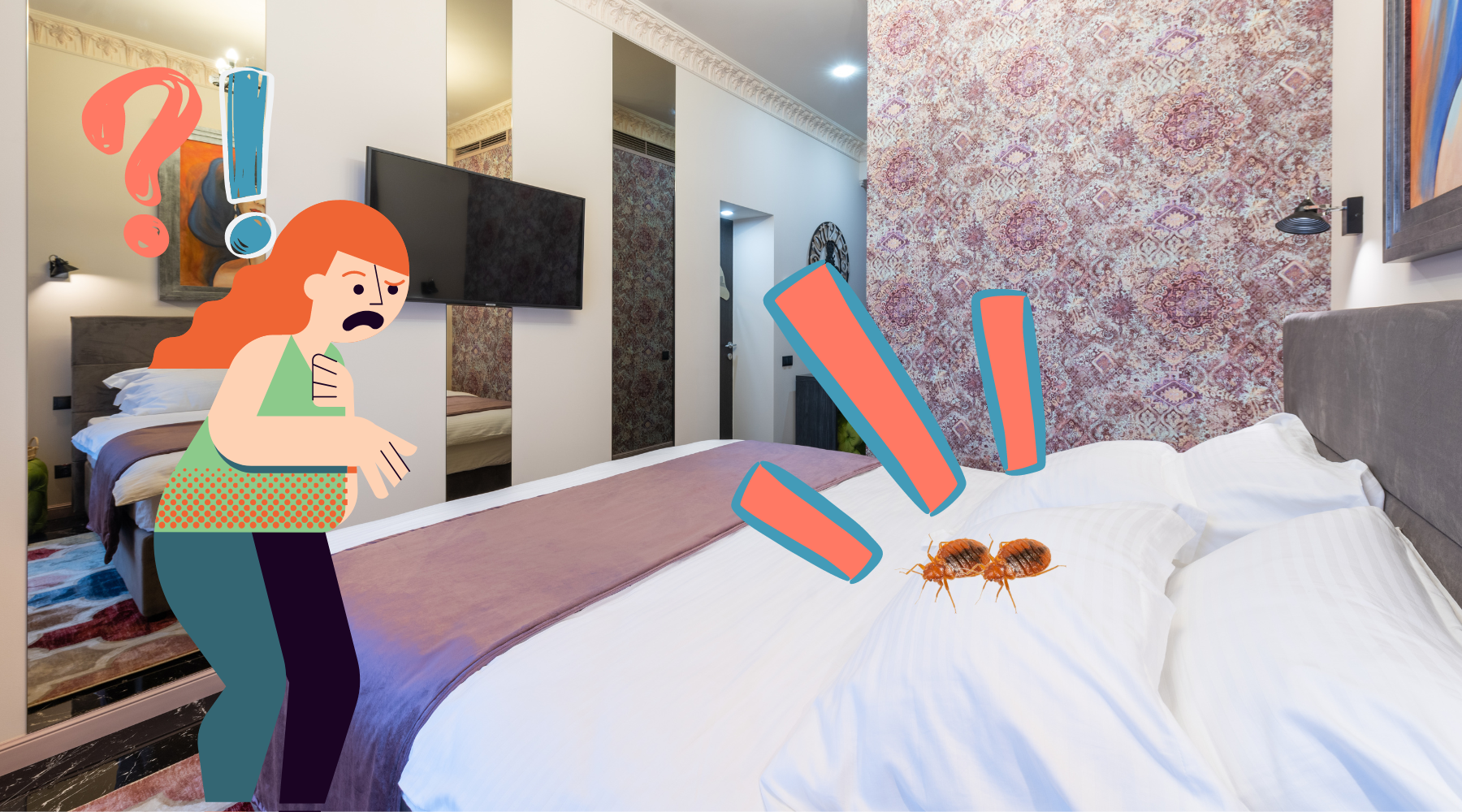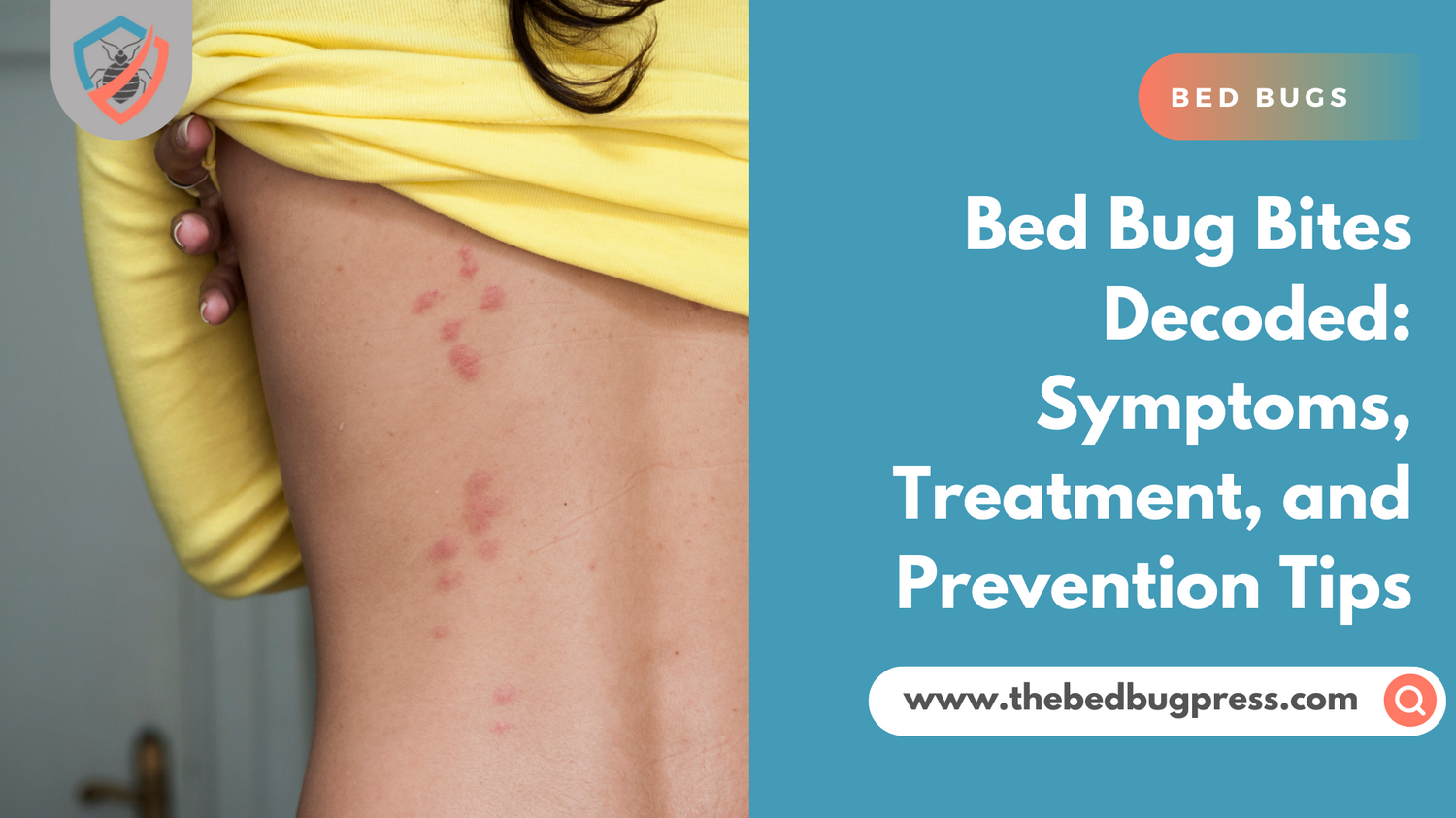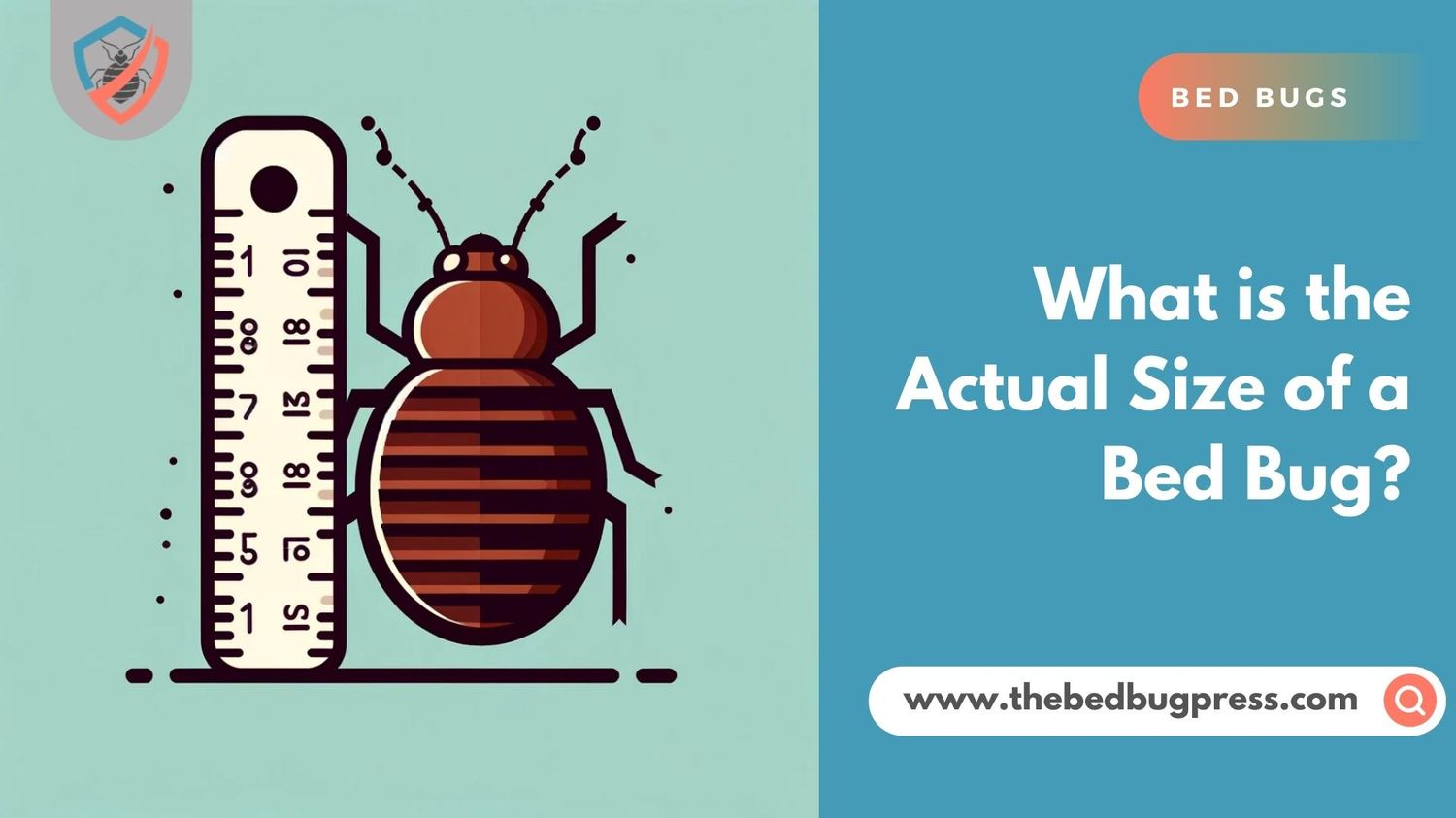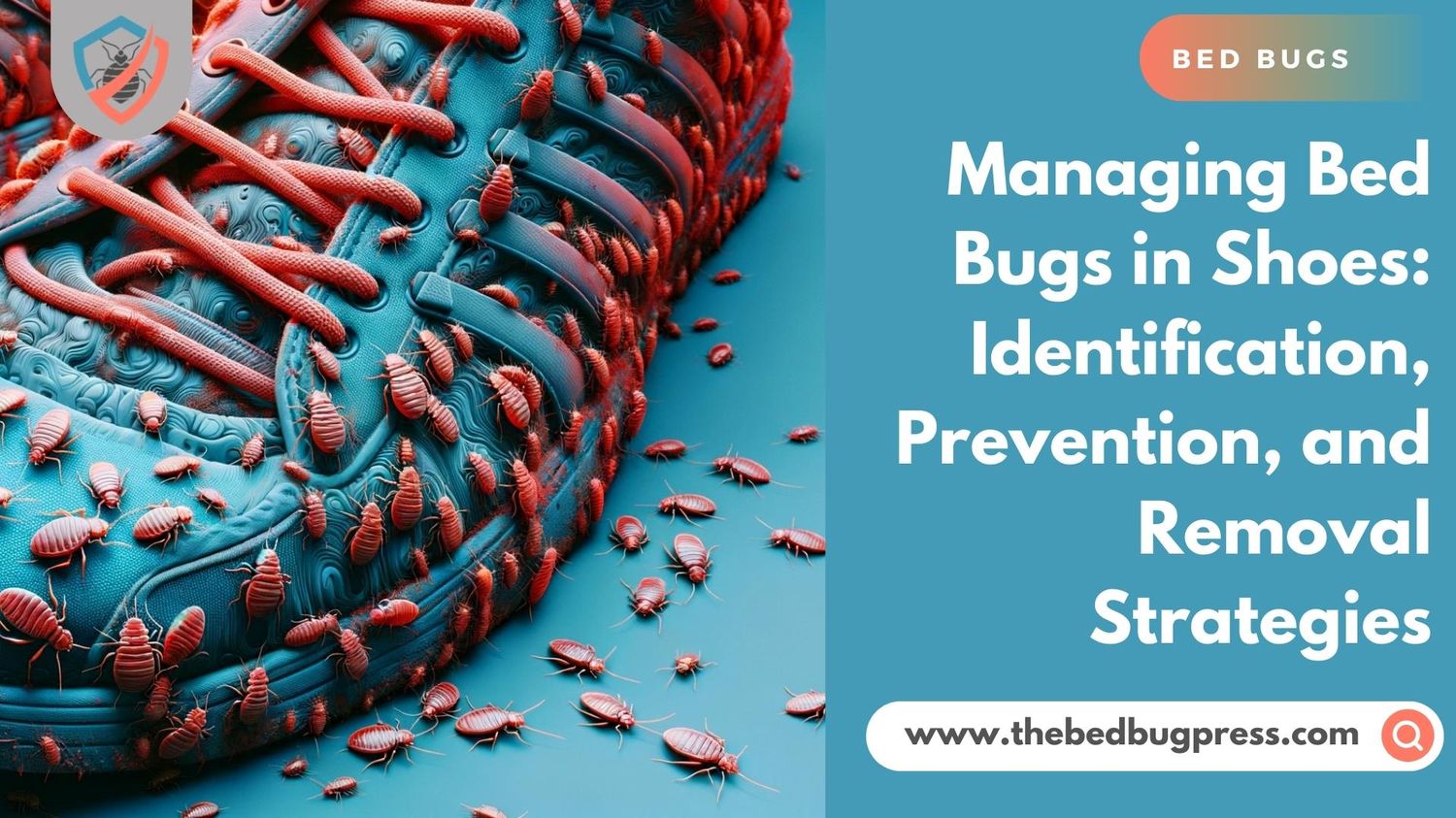From the moment you check in to your hotel, there’s always a slightly looming feeling of dread in your gut that maybe this hotel could have a bed bug infestation. Don’t worry, while it may be a scary thought, with our helpful guide on what to do if you spot bed bugs in your hotel room you’ll know exactly what steps to take!

Ways to Check for Signs of Bed Bugs in Your Hotel
It’s always unsettling to think that your hotel room might be harboring unwanted pests. But fear not, because, with our tips and tricks, you can easily check your hotel room for signs of bed bugs on your own! Here are some ways you can check for signs of bed bugs in your hotel:
Check all surfaces, crevices, and bedding (including mattresses and sheets) for live or dead bed bugs, their eggs, and signs of their activity like excrement spots.
Inspect the headboard, behind wall hangings, and any other dark crevices where bed bugs may hide.
Look for red spots on the sheets that could indicate blood from an insect bite.
It’s important to be diligent when checking for signs of bed bugs in a hotel room. With just a few simple steps, you can rest assured knowing you are taking precautions to protect yourself from an infestation.
Ways to Keep Yourself Safe if Your Hotel Has Bed Bugs
Dealing with bed bug infestations in hotel rooms can be a harrowing experience. But with these helpful tips and tricks, you can make sure that staying safe from potential pests is easy! Here are some ways to keep yourself safe if your hotel has bed bugs:
Keep your belongings off the floor – this includes luggage, bags, and other items. Place them in a luggage rack if available in your room.
Be mindful of where you put your clothing – preferably hang it up in a closet or drawer.
Don’t leave any food out on surfaces such as tables or nightstands.
Check for bed bugs before unpacking your belongings.
Staying safe and protected while at a hotel is important — but it doesn’t have to be hard. With our guide to keeping yourself safe if your hotel has bed bugs, you’ll never have to worry about pest infestations again!
The Nightmare of Sleeping in a Hotel Bed Infested with Bed Bugs- Should you Stay?
Sleeping in a hotel bed infested with bed bugs can be a nightmare and potentially ruin your trip. If you discover bed bugs in your hotel room, it is best to contact hotel staff and opt to leave and find alternative accommodation. Here are some reasons why:
Health risks
Bed bugs are not known to transmit diseases, but their bites can cause allergic reactions, skin irritation, and in rare cases, anaphylaxis. If you are sensitive to insect bites or have a weakened immune system, staying in a bed bug-infested hotel room can pose a health risk.
Difficulty sleeping
Bed bugs are nocturnal and feed on human blood while you sleep, causing discomfort and making it difficult to get a good night’s sleep.
Risk of spreading
Bed bugs are excellent hitchhikers and can easily spread to other parts of your luggage, clothing, or belongings. If you continue to stay in the hotel, you risk bringing bed bugs back home with you and potentially infesting your own living space.
It’s not worth it
It’s simply not worth the hassle and discomfort to stay in a bed bug-infested hotel room. You paid for a comfortable and enjoyable stay, and bed bugs can ruin that experience.
If you find bed bugs in your hotel room, alert hotel staff immediately and request to be moved to a new hotel room. If the hotel management is unable to provide a bed bug-free room, it’s best to find alternative accommodation.
How Bed Bugs Can Ruin a Hotel’s Reputation
Having a bed bug infestation inside a hotel is one of the worst things that could happen, as it can ruin the reputation of the establishment for years to come. Not only will it cause physical discomfort to the guests, but it can also lead to serious financial losses due to customers taking their business elsewhere and legal repercussions for those affected by the infestation.

Returning Home? Follow These Steps to Prevent Bringing Bed Bugs Home With You
Bed bugs are notorious hitchhikers and can easily be brought home from hotels, airplanes, and other public places. If you suspect that you may have been exposed to bed bugs while traveling, follow these steps to prevent bringing them home with you:
Inspect your luggage.
Before you pack your bags, inspect them for any signs of bed bugs. Look for small, reddish-brown bugs, shed skins, or dark spots that could be bed bug fecal matter. If you see any signs of bed bugs, wash your luggage and clothing in hot water and dry them on high heat.
Wash your clothes.
When you return home, wash all of your clothes, including those that you didn’t wear, in hot water and dry them on high heat. This will kill any bed bugs or eggs that may have hitchhiked on your clothing.
Vacuum your luggage.
After you’ve unpacked your bags, vacuum them thoroughly, paying close attention to seams and crevices where bed bugs may hide. Dispose of the vacuum bag in a sealed plastic bag immediately afterward.
Inspect your home.
Check your bed, furniture, and other areas where bed bugs may hide for any signs of infestation. Look for small, reddish-brown bugs, shed skins, or dark spots that could be bed bug fecal matter.
Use bedbug-proof covers.
If you’re concerned about bed bugs, consider using bed bug-proof covers on your mattress, box spring, and pillows. These covers will prevent bed bugs from hiding in these areas and make it easier to detect any signs of infestation.
Take precautions in the future.
When traveling, inspect your hotel room for bed bugs before unpacking your bags. Keep your luggage off the floor and use luggage racks or stands. Consider packing your clothes in a sealable garbage bag to prevent bed bugs from getting inside.
With these steps, you can ensure that after your vacation you only bring back memories – not bed bugs!
10 Facts That Will Make You Think Twice About Staying at a Hotel with Bed Bugs
Bed bug infestations are on the rise; in fact, it seems like nearly every day another hotel guest is complaining about bed bugs. But this isn’t just an annoyance – bed bugs can cause serious health problems and financial losses. To help you be more aware of what to look out for when booking a hotel, here are 10 facts about the dangers of staying in infested rooms:
Bed bugs can travel through walls, pipes, and electrical wiring easily – that means it’s easy for one room to become affected even if other rooms remain clean.
Bed bugs are not just found in beds – they can also hide in furniture, carpets, and other areas around the room.
They don’t just bite humans – they will also feed on your pets if given the chance!
Bed bug bites can result in skin rashes, inflammation, and allergic reactions in some people.
They reproduce quickly – female bedbugs can lay up to 500 eggs over their lifetime!
In addition to being uncomfortable and unsightly, a bed bug infestation can lead to costly repairs for the hotel as well as legal action from guests who were affected by the problem.
Bed bugs are hardy creatures – they can survive for months at a time without a food source and extreme temperatures don’t phase them either!
Not all pest control treatments are effective to kill bed bugs – some require multiple treatments or an excessive amount of chemicals that could be hazardous to human health.
Bed bug eggs are resistant to most insecticides – which means that if any do manage to hatch, they won’t be killed off easily.
A single female bed bug can cause an entire infestation – so it’s important to always keep an eye out when staying at a hotel or other accommodation space!
Stay vigilant when staying in hotels to avoid ruining your vacation and bringing home bed bugs.
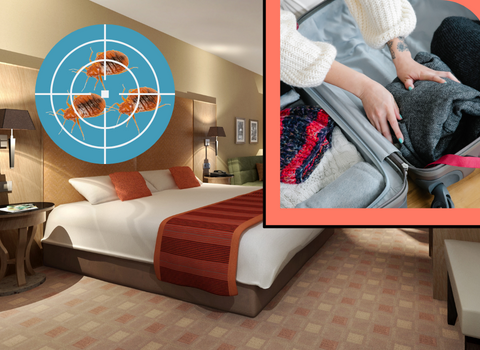
Prepare for Battle: Tips for Winning the War Against Home-Invading Bed Bugs
Bed bugs are becoming an increasingly common problem in homes and apartments – but there’s no need to surrender your bed to these unwelcome guests! Here are some tips for winning the war against home-invading bed bugs:
Start by identifying potential hiding spots around the house such as furniture, mattresses, and carpets. inspect them thoroughly for any signs of bed bug activity.
Immediately treat any affected areas you find with a suitable insecticide or other treatments.
Protect yourself from bed bug bites while treating the infestation – wear protective clothing that covers your skin, eyes, and mouth.
Regularly vacuum and steam clean floors, furniture, and rugs to remove any remaining eggs or larvae.
Consider using traps such as bed bug interceptors or mattress encasements which can help prevent their spread around the home.
To avoid re-infestation, regularly monitor areas where bed bugs can be found – this includes furniture, carpets, and mattresses.
By taking proactive steps like these, you will be armed and ready in your fight against invading bed bugs!

